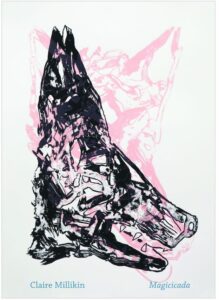 Review by Judy Kaber
Review by Judy Kaber
A scholar and a prolific writer, Claire Millikin’s ninth book of poetry, Magicicada (Unicorn Press, 2024), reflects her continuing feminist stance. In it she examines the fate of girls and young women who grow up voiceless and abused in a patriarchal society. Having been raised in the deep south, the song of periodical cicadas wove itself into Millikin’s consciousness and in this book of poems she uses the life cycle and the song of those cicadas as a vehicle to express the brutality of a young teen placed in isolation and her ultimate release.
The poetic forms in the book are primarily free verse, but the persona of the girl in solitary confinement is introduced in a villanelle which ends:
Solitary confinement for the fourteen-year-old truant
who waits it out, eating just enough to stay alive,
waiting for someone to half believe, to take her side.
They will teach her what should never be taught,
solitary confinement where the child memorizes silence.
The repetitive form of the villanelle brings home the despair of the child, the depth of the abandonment and abuse. Too many women will be able to relate to this, however, the poems move forward carrying the reader to healing and even the possibility of forgiveness.
It’s evident that care was taken in the arrangement of the poems in this book with clear connections between poems, one poem expanding into the next. The poem, “Red Dog,” continues the braid of girl and insect and the cry for/of release:
Buried seventeen years,
at last the cicadas’
risen cries become harmonium, one note biding the next,
audible distance
…
They placed me in solitary
because they considered me imperious. Imperious.
I was fourteen years old, starving,
and too scared to talk.
Cicadas’ music is almost violence,
almost an endless
series of buckling ribs. No one
spoke to me or listened in those solitary days.
The beauty and urgency of these poems is heartbreaking. The reader is pulled along looking for the release that is promised in the metaphor of the cicadas, that after being a “burrowing nymph” in the ground, the child, like the insect, will rise and sing.
Millikin’s description of the Magicicada’s ascendance in the poem, “Succor,” uses technical details, linguistic fluidity, and a rising tone to continue to lead the readers toward the possibility of salvation, even in light of institutional maltreatment.
Then their voices strum the acres—
syncopating tymbal by tymbal,
a chorus deeper
than crickets, locusts, katydids,
cicada wings fan hollow ribs,
like wires plucked a thousand, thousand times.
In the same poem, we see how the speaker’s incarceration leads to an inner strengthening, the shaping of a voice, if as yet only an interior one.
You don’t spend seventy-seven days
in solitary confinement at age fourteen
without the need to say this
is what it was, your fifteenth birthday
in solitary’s
hard human sky.
Where you learned to sing
without a congregation.
Described as savage—“The essence of my father was violence”—the father becomes vulnerable in the poem, “Cicada Heart.” Here the father’s heart trouble is compared to the cicada heart with seven parts, as if his heart may also be divided into unknowable sections, his own weakness now laid bare:
I hear my father’s voice, west Georgia drawl, agreeing
to submit to anything that might save his life,
and he sounds weak
as if he never used a closed fist.
In the penultimate poem in the book, “Pink Dress Truant,” the speaker, wearing the gift of a pink dress, becomes Jackie Onassis “climbing/ the back of the car like a mystic,/ refusing to wash off the blood,/ hide what they’d done.” Lodged solidly in this poem are the beginnings of healing, the hope for ultimate resolution, even, possibly forgiveness.
I’m begging even now
that some late pink sky might heal us—
put on this dress of a solitary place,
pink of civil sunset
then nautical twilight then all the way
through astronomical dusk, this garment.
Magicicada is a book that skillfully combines science and sorrow, that weaves a story of swallowed self-blame and muffled voice into the possibility of a re-emergence in hope and song. Some of the poems in the book are difficult to read in their brutal exposure of the inhumanity of our society, but ultimately the poet’s rich language and powerful imagery give us permission to envision a more coherent and kinder future.
Magicicada by Claire Millikin
Unicorn Press, 2024 $25
9780877751618
Judy Kaber is the author of three chapbooks. Her poems have appeared in journals such as Pleiades, Poet Lore, and Prairie Schooner. Her poem, “Sword Swallowing Lessons,” was featured on “The Slowdown.” Judy won the 2021 and 2023 Maine Poetry Contest. A Maine Literary Award winner, her book, Landscape With Rocks, Sky, Nails, is forthcoming from Fernwood Press in 2025. She is a past poet laureate of Belfast, Maine (2021-2023).
